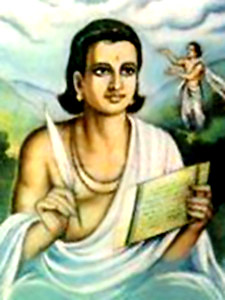 Gupta era is known to be the classical age as it had seen the development of various art forms that included poetry, literature and so on. In poetry the greatest poet of India lived at this period Kalidasa. Sanskrit Poetry was highly developed during the rule of Gupta Empire. Kalidasa is known to be the contemporary of Chandragupta II. He was a learned man, elegant, cultured and aristocrat. Kalidasa`s inspiration is lyrical however he wrote dramas and epics. He took his themes from the Indian Puranas and epics. His epic poems are the Kumara-Sambhava, the `Birth of Kumara` and the Raghu-Vamsa, the `Race of Raghu.`
Gupta era is known to be the classical age as it had seen the development of various art forms that included poetry, literature and so on. In poetry the greatest poet of India lived at this period Kalidasa. Sanskrit Poetry was highly developed during the rule of Gupta Empire. Kalidasa is known to be the contemporary of Chandragupta II. He was a learned man, elegant, cultured and aristocrat. Kalidasa`s inspiration is lyrical however he wrote dramas and epics. He took his themes from the Indian Puranas and epics. His epic poems are the Kumara-Sambhava, the `Birth of Kumara` and the Raghu-Vamsa, the `Race of Raghu.`
Kumar is an alternative name of Skanda, the war-god. The story runs that the gods in their unending war with the Asuras needed a leader. Lord Shiva was the eligible person. He was in meditation. His Samadhi was interrupted by Kama, the god of love, accompanied by his wife Rati. However Shiva disliked this and burnt Kama Deva with the glance of his third eye. The gods had intervened and Kama was restored to life. Lord Shiva had a son from Uma. Kalidasa describes their marital bliss in lively colours that. The Raghu-Vamsa presents the lineage of Lord Rama and describes the life of Raghu who gets a child after serving Nandini the great cow. He gets a son Aja. From him Dasaratha was born, the father of Ram.
In Meghaduta, Kalidasa achieves lyrical perfection. The subject of the poem is marital love. A Yaksha, a divine being in the service of Kubera, god of wealth, is exiled by his master. He is supposed to leave his wife. He languishes for her and pours out his grief to a cloud drifting towards his home where his wife lived. His wife is also grieved at this.
In Ritusamhara he has described six seasons and its impact on human mind. He is regarded as the best poet in Sanskrit. Nature has been skilfully described. His poetry is graceful, simple and sentimental. It has striking figures of speech specially the beautiful varied and apt similes. His characters are masterpieces. Emotions of love and pathos are described very beautifully. His description of nature is matchless. The works of Kalidasa are also valuable for the ideals, which they place before the society. By studying them the reader knows the Hindu ideals and also about the duties and responsibilities of persons in different classes of society and in various stages of life. His writings abound with pithy sayings containing salutary or good advice couched in beautiful language. From these writings persons in all walks of life can derive immense benefit.
Other epic poets of the period are Bharavi and Magha. Bharavi wrote the Kiratarjuniya in 550 A.D. Bharavi`s power of description and dignity of style impresses the reader but his literary gymnastics lessen the effect instead of enhancing the poetic impression.
Magha was a poet of Yaso-varman and others like Vatsabhatti, Kubja and Saba. Janakiharana was a maha kavya written in the timeframe 517-526 A.D. by Kumaradasa. Kumaradasa imitates Kalidasa but is not able to reach the latter`s height and grandeur.



















